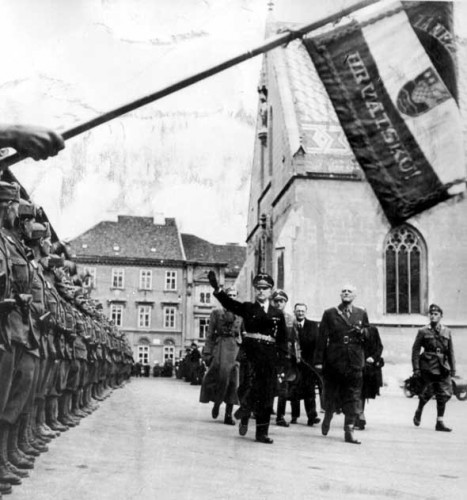Ex: http://www.counter-currents.com/
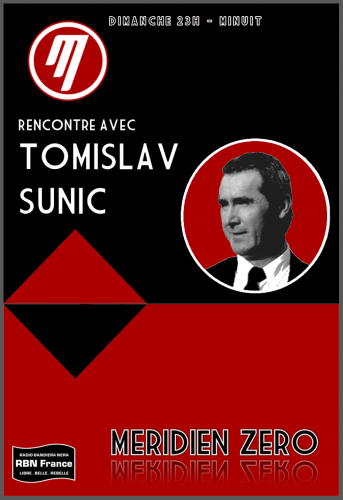 Tomislav (Tom) Sunić is a former US professor, author, translator and a former Croat diplomat. He did his undergraduate work in literature and languages in Europe. He obtained his doctoral degree in political science at the University of California. Dr. Sunić has published books and articles in French, German, English, and Croatian on subjects of cultural pessimism, the psychology of communism and liberalism, and the use and abuse of modern languages in modern political discourse. The present interview explores a little the man behind the ideas; we learn a few things never previously told by Dr. Sunic about his past and personality. Of course, Dr. Sunic tells us about his new book in French, his early years in Communist Yugoslavia, the art of translating, and more.
Tomislav (Tom) Sunić is a former US professor, author, translator and a former Croat diplomat. He did his undergraduate work in literature and languages in Europe. He obtained his doctoral degree in political science at the University of California. Dr. Sunić has published books and articles in French, German, English, and Croatian on subjects of cultural pessimism, the psychology of communism and liberalism, and the use and abuse of modern languages in modern political discourse. The present interview explores a little the man behind the ideas; we learn a few things never previously told by Dr. Sunic about his past and personality. Of course, Dr. Sunic tells us about his new book in French, his early years in Communist Yugoslavia, the art of translating, and more.
Not from a socio-political perspective, but rather from an everyday man-in-the-street perspective, how does the Yugoslavia of the 1950s and 1960s differ from Croatia in 2010?
The Yugoslav times were less crowded, although the Yugoslav space was more condensed and bleak—literally speaking—a black and white environment. Vulgar and disciplinary were the daily discourse and the surrounding communist insignia. By contrast, despite the aura of decadence today, especially as far as the incoming liberal mores are concerned, the flow of time in Croatia is far more dispersed. Time flies faster now. People are beginning to learn the liberal mores of fake mercantile politeness—with its obvious downturn in the loss of identity.
You have stated in previous interviews that in 1971 you hitchhiked to Kashmir. You must have found yourself in at least one or two tricky situations during that adventure… What was it like to travel across Eastern Europe and Asia in the midst of the Cold War? What motivated your departure? Surely, there are less radical ways of escaping than hitchhiking to India. And why India and not, say, Italy or Greece?
I could not put myself into the wider socio-historical perspective back then. I was to a large degree blessed by willful ignorance and a solid degree of adolescent romanticism. Hence the reason that it never crossed my mind that I could get killed, stabbed, or kidnapped during my hippie days. I never thought about my tomorrows. I actually hitchhiked from Copenhagen across Italy, took the ferry from Brindisi to Corfu in Greece and continued then my odyssey, literally without a penny, by train across Turkey to Teheran. Greece was a dictatorship back then, in 1972. Shah Reza Pahlavi was the boss of Persia. The war between Pakistan and India had just ended. But I lived my magic double life; India was a location of initiation for all hippies world-wide.
A man who loves literature lives partly through it. What would you say are the key texts that defined you as a person and as a thinker? And why?
Well, I define the choice of my prose by my character. I read Herman Hesse, not because he was a standard hippie literature in my adolescence; he was also a great author who managed to combine, without resorting to a violent narrative or pornography, the world of illusions and of magic realism which I craved. It was me. Hesse was a good Bildungsroman for a 19 year boy like me. In fact, I do not rule out now that I may have been a reincarnated Byron, or Céline, or Kerouac, thrown on a voyage through Asia. When walking down the street of Kabul in my torn pants, t-shirt, and my earrings, a sense of déjà vu was creeping through my head; I must have been, long time ago, a courtier, or some important emissary during the military campaigns of Alexander the Great. This image still haunts me.
Later on, as I matured, I again just followed my instincts and not any political fashion or agenda. I must have been a reincarnated Louis Ferdinand Céline—so I started learning every nook and cranny of the French language and spirit. Later on, when I embraced political scientist Carl Schmitt and sociologist Vilfredo Pareto, or Alain de Benoist, the answer was quite simple. Their style reminded me of my own hidden sense of beauty—in a broader sense.
We know that during the 1980s you immigrated to the United States. What were your first impressions of the Americans, versus what you knew about them previously as a distant observer? What did you like, and what did perplex you the most, about them? No doubt perception and reality differed greatly in some important respects.
Crowds and noise. This was my first impression after landing in America. I can tell by the level of noise how civilized or barbaric a country is. In public spaces or on public premises I like silence. These vicarious prosthetic (or better yet: pathetic) devices, like the early walkie talkies or the walkman, radios, and, later on, all these anthropomorphic extensions, like cell phones and iPods, became symbols of spiritual rootlessness and the sign of physical superfluity, of being at the wrong place and in wrong time. I do not like fifth gear; an America shifted to neutral would have been an ideal place for me. I regret not being born two hundred years earlier, in the antebellum South. On the communicational level, I could not put up with the endless moralizing and formalistic pep talks in America. Let alone the fact that I could not grasp, and still can’t, coming from the communist universe, why a White nation of such an impressive size, loves to indulge in self-hatred, in feelings of guilt, while catering to the lowest dregs of its society. This was not America I had dreamt of.
You qualified as a political scientist in the United States and held academic positions for a time in American universities. You and I have both written about the latter, as well as their counterparts in Europe, being in the grip of Freudo-Marxist scholasticism. This implies that Freudo-Marxist scholastics constitute a species. I suggest that the species is not homo americanus, because homo americanus is a result, not an agent. Am I wrong? Maybe you could describe the zoology of Freudo-Marxist scholasticism—its habitat, its social organization, its archetypical personality, its feeding habits…
Is my social behavior inborn or is it acquired? This is the timeless question regarding the mystery of life. Just as there must be a Catholic or a liberal gene, there must have also been a special genetic proclivity among countless Europeans to travel into the unknown, overseas, all the way across the Ocean, all the way across continental America. There must have been a primeval will to power unprecedented in the history of the White man. But, on the other hand, this Promethean spirit morphed into a homo œconomicus, a peculiar non- European species who soon found his Double in what I call homo americanus—a biped solely interested in how to make a quick buck, regardless of his geographic latitude. I am sure that the vast majority of people who have come to America over the last three hundred years must have had money as their prime motive, and not some idea of spiritual freedom or genetic betterment. As far as Freudo-Marxian scholasticism is concerned, let me remind you that psychoanalysis and Marx’ teachings have always had more disciples in the US academia than in Europe. In its ideal-typical manner, “true” Marxism took roots in America faster and better than in communist Eastern Europe. Hence the reason that this postmodern egalitarian drivel, the multiracial, promiscuous, Obamanesque “multiethnic sensitive training” and engineering, has more momentum now in America than anywhere else in Europe, let alone former communist Europe.
The 1990s were a tumultuous decade for the former Yugoslavia. We saw its dismemberment during the first half and in 1999 we saw Clinton bomb Serbia for three months—for reasons that, viewed from 2010, now seem rather nebulous. Against this backdrop, how would you summarize this decade for you personally?
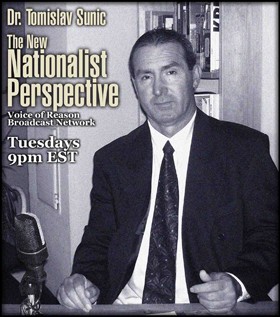 In 1993, upon my return from the USA, I became a diplomat in charge of cultural promotion in the early Tudjman government. I gave hundreds of speeches all over America and Europe regarding Croatia’s place in the world, the fallacy of multiculturalism, the fraud of modern historiography, etc. Disillusion and feelings of betrayal s00n followed. I had seriously thought that the legacy of communism was going to be removed, along with is former architects. Instead, the war in ex-Yugoslavia turned into an ugly war between similar ethnic groups. One thing I learned though: never get carried away too much even with your own political or philosophical ideas—they can backfire. Now, 15 years later, it seems to me that the whole Balkan chaos was cooked up by former Yugoslav communist elites—who in a twinkle of an eye decided to become either good liberals or petty nationalist rabble-rousers.
In 1993, upon my return from the USA, I became a diplomat in charge of cultural promotion in the early Tudjman government. I gave hundreds of speeches all over America and Europe regarding Croatia’s place in the world, the fallacy of multiculturalism, the fraud of modern historiography, etc. Disillusion and feelings of betrayal s00n followed. I had seriously thought that the legacy of communism was going to be removed, along with is former architects. Instead, the war in ex-Yugoslavia turned into an ugly war between similar ethnic groups. One thing I learned though: never get carried away too much even with your own political or philosophical ideas—they can backfire. Now, 15 years later, it seems to me that the whole Balkan chaos was cooked up by former Yugoslav communist elites—who in a twinkle of an eye decided to become either good liberals or petty nationalist rabble-rousers.
Since 2007 you have been very active and much more visible that I remembered in the earlier part of the decade. You published Homo Americanus, in English, and La Croatie: un pays par défaut? in French. What motivated this increase in activity?
Well, it is in my genes. I am afraid of being swallowed up by the merciless flow of time. Feelings of shame and despair envelope me every time I remain idle. I will lecture and write as long as I breathe.
Tell us about your latest book. What are its main theses? And why did you chose to write it in French?
The book deals with the meaning of identity in the age of globalism. As a case study I use Croatia and Croats and their troubles in defining themselves in postmodern world. It is a fairly good academic work, providing a solid bibliography. The book discusses the danger of conflictual victimologies and why the sense of victimhood leads inevitably to friction and war and never to interethnic or interracial understanding. My book is a good read for somebody who wishes to find out more about multicultural artificial states and modern historiography —which has been to a large extent monopolized by modern hagiographers. The reason I wrote it in French is simple: I owed it to myself and to my good sense of the French language—which is a very rich language on both the conceptual and aesthetic levels. I also owed something to French-speaking friends of mine.
Besides English, French, and of course Croatian, you are also fluent in German, and in your philosophical works have drawn from many suppressed German sources. German is a contextual language and one that allows the formation of seemingly endless compounds. Individual words (Volk is a well-known example) may also package shades of meaning, implications, not known in English. Tell us about the difficulties in translating, and accurately conveying the style and meaning of the original in our modern lingua franca, English.
Any translation is a separate work of art. Not just translating poetry, but translating even the smallest essay in the field of humanities presents a huge challenge. I have always admired a good translator—more so than the author of the original work himself. Language does not have just the functional role. It is a treasure trove of spirituality, especially for people with a strong sense of the metaphor and poetry. The German language, the richest European language, with a very precise normative grammar, has been thrown aside since WWII. Students in the West no longer study it. It could have become, like Latin, the major force for uniting Europe or for that matter the main communication vehicle for the White man.
The advent of the internet now makes it very difficult for one to hide. What do you think former classmates and friends—people you lost touch with many years ago—think when they look you up? (I am not implying you ought to care.)
Even if many actually look me up on the internet, I doubt they understand all the sociological or political nuances of my prose or the prose about me. Some do, of course—at least, some professors or students I worked with in the USA. However, the internet image does not reflect the real object itself—in this case myself. But those who used to know me—given that the internet is more or a less a solitary game—must think of me, even if they do not like my stance; “What a heck of a guy, Tom is!”
What would you say if someone, maybe someone you know, maybe even someone whose opinion matters to you, who is well meaning, but who is also little naive or misinformed, asks, with some concern over a cup of coffee, ’Hey, Tom. What made you go all Nazi? You have a PhD in political science, come from a respectable family, your father was a lawyer—and you… you turned out racist. What happened?’
The usage of this type of negative epithet is pretty current in Western media and to some extent in the Western judiciary. The advantage of living in post-communist countries is that words such as “Nazis,” “fascists,” “racists,” no longer have such a bad resonance, despite the fact the new political class all over Eastern Europe is trying again legally to resurrect them with its original criminogenic meaning. Of course, this all happens under pressure from the West, where these qualifiers are in constant usage today. Where communism left off, modern liberalism continued… I need to remind you that the usage of these value-loaded qualifiers was standard practice in the communist vernacular and the media against any dissident, aired on all wavelengths 24 hours a day. Towards the end of the communist rule there was an enormous amount of psycholinguistic saturation amidst the populace, so that everybody got sick of that language—even the communist scribes who had made these words ‘fashionable’ in the first place. Distorted political verbiage was the main cause of the collapse of communism. Hence, the paradox that these words—used today as shut-up words in the West— no longer have such an oppressive weight in Eastern Europe. In fact, they often serve as a badge of honor for some people!
I have expressed my own opinion on the subject, but, as a director of the American Third Position political party, perhaps your have a different one—What are the failed strategies of the Right? And, What do you propose should be done to turn the tide? What is, as you see it, your contribution to this very difficult enterprise?
First and foremost, all Right-wingers, all nationalists, all patriots, or—let us call them rather nicely—“all racially and culturally conscious Whites,” must cease blaming the Other for their own patent failures to organize intellectual or political counter-power. Blaming the Other automatically and subconsciously implies that the Other is better than oneself. Well, he is not. It is not the Other, be he a Jew, a Liberal, a Black man, or an Immigrant, who is responsible for the current predicament of White man. Those who are to be blamed are White activists or thinkers themselves, who in most cases do not distinguish between cause and effect. They first need to exercise some conceptual gymnastics. The monolithic linear black and white mindset, inherited from Judeo-Christianity needs to be removed along with its secular offshoots, such as egalitarianism, with all its modalities, e.g. liberalism, globalism, communism. If white nationalists do not start thinking and conceptualizing the world in a more polymorphous and cyclical fashion, with millions of shadings between the “good” and the “evil,” they will be wasting yet more of their time. Once the objective real world is conceptualized as a multifarious phenomenon, things will start falling into their place. Including the need to establish a new cultural hegemony.
What would you like to accomplish in the next 10 years?
I would like to publish at lest several more books, in German, English, and French. I hope I can be of some service to the rise and spread of the American Third Position.
How would you like to be remembered in a hundred years? And how do you think you will be remembered?
Well, I want to be remembered as somebody who placed the interests of his community above his own and above the interests of his own family. As somebody who absolutely rejects money as a means of communication, I would expect this will be accepted without caveats from my present or future colleagues and friends. I’d like to be remembered as somebody who left timeless traces in our Western heritage.
I’d like to be remembered as an author and innovator, as a path-breaker whose words will resonate through yet another set of incoming crowded times.
Thank you, Tom, for granting this interview.
Source: http://www.wermodandwermod.com/newsitems/news041120102141...



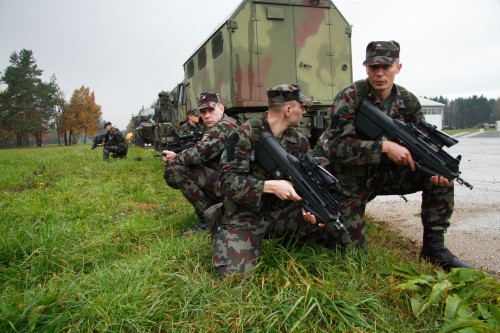
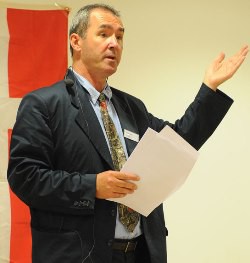 DMZ: Welche Rolle spielten dabei die europäischen Großmächte?
DMZ: Welche Rolle spielten dabei die europäischen Großmächte?
 del.icio.us
del.icio.us
 Digg
Digg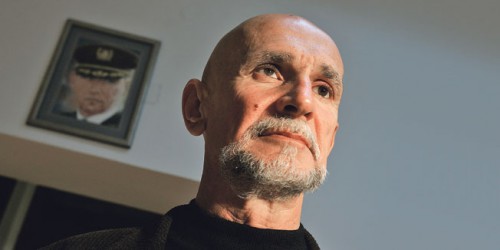


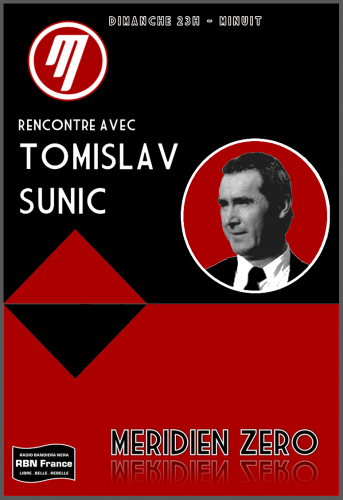 Zur Kennzeichnung der gegenwärtigen juristischen und politischen Debatte in Osteuropa lautet der beste Begriff ‚dekomunizacija‘ (Entkommunifizierung), da er in spezifischer Weise das erlittene Unrecht der früheren Opfer des Kommunismus benennt, wobei er gleichzeitig auf die immer noch präsenten kommunistischen Kader und ihre Mitläufer fokussiert. Verstehen läßt sich das Konzept der „lustracija“ bzw. Entkommunifizierung in Kroatien sehr leicht. Die rechtliche Umsetzung ist jedoch beinahe unlösbar. Warum ist das so?
Zur Kennzeichnung der gegenwärtigen juristischen und politischen Debatte in Osteuropa lautet der beste Begriff ‚dekomunizacija‘ (Entkommunifizierung), da er in spezifischer Weise das erlittene Unrecht der früheren Opfer des Kommunismus benennt, wobei er gleichzeitig auf die immer noch präsenten kommunistischen Kader und ihre Mitläufer fokussiert. Verstehen läßt sich das Konzept der „lustracija“ bzw. Entkommunifizierung in Kroatien sehr leicht. Die rechtliche Umsetzung ist jedoch beinahe unlösbar. Warum ist das so?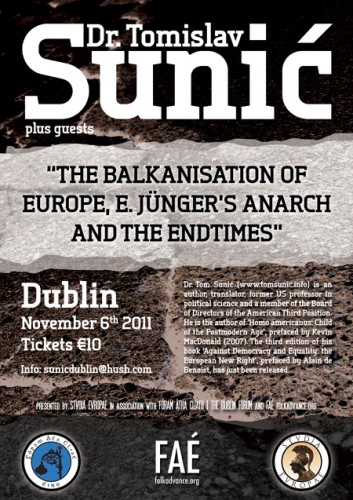 Während des Kalten Krieges waren die Amerikaner intelligent genug, das Wannseeinstitut des SD anzuzapfen, ein auf höchster Ebene angesiedeltes Spionagebüro, das mit der SS verbunden war. Das Institut wurde von dem jungen Rechtsanwalt Major General Walter Schellenberg (1910-1952) geführt. Während des Zweiten Weltkrieges nutzte Schellenberg die Fähigkeiten vieler hochqualifizierter europäischer Akademiker, deren Aufgabe es war, die kommunistische Mentalität zu analysieren. In späterer Zeit, nach dem Kriege, waren viele sich mit Sowjetologie und Kremlforschung befassende US-basierte Denkfabriken weitgehend nach dem Muster der nationalsozialistischen, deutschen Einrichtung Wannseeinstitut SD strukturiert.
Während des Kalten Krieges waren die Amerikaner intelligent genug, das Wannseeinstitut des SD anzuzapfen, ein auf höchster Ebene angesiedeltes Spionagebüro, das mit der SS verbunden war. Das Institut wurde von dem jungen Rechtsanwalt Major General Walter Schellenberg (1910-1952) geführt. Während des Zweiten Weltkrieges nutzte Schellenberg die Fähigkeiten vieler hochqualifizierter europäischer Akademiker, deren Aufgabe es war, die kommunistische Mentalität zu analysieren. In späterer Zeit, nach dem Kriege, waren viele sich mit Sowjetologie und Kremlforschung befassende US-basierte Denkfabriken weitgehend nach dem Muster der nationalsozialistischen, deutschen Einrichtung Wannseeinstitut SD strukturiert. Heutzutage besteht trotz der scharfen antikommunistischen Rhetorik, die nirgendwo im Westen ihresgleichen hat, in Zagreb ein großer Teil der philosophischen Fakultät und auch der Politikwissenschaften (den Hauptzentren der öffentlichen Meinung) aus Männern und Frauen, deren Eltern eingefleischte Kommunisten waren. Auf welche Weise sollte dort aufgeräumt werden? Es ist recht leicht sie kenntlich zu machen, aber unmöglich hier eine ‚lustracija’ durchzuführen.
Heutzutage besteht trotz der scharfen antikommunistischen Rhetorik, die nirgendwo im Westen ihresgleichen hat, in Zagreb ein großer Teil der philosophischen Fakultät und auch der Politikwissenschaften (den Hauptzentren der öffentlichen Meinung) aus Männern und Frauen, deren Eltern eingefleischte Kommunisten waren. Auf welche Weise sollte dort aufgeräumt werden? Es ist recht leicht sie kenntlich zu machen, aber unmöglich hier eine ‚lustracija’ durchzuführen.
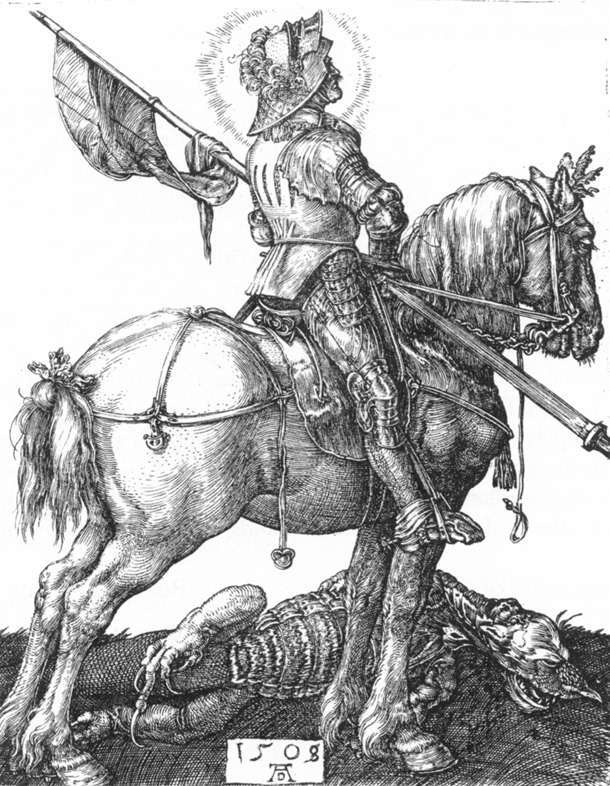
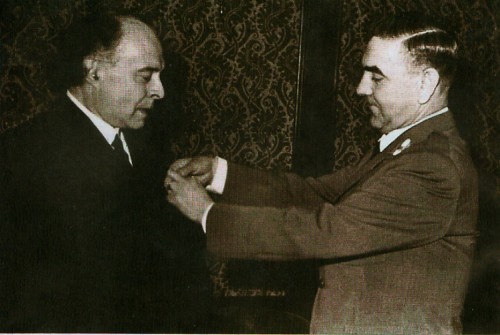
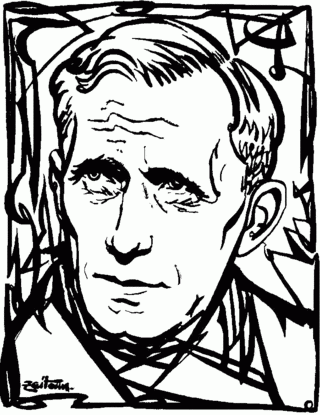 Das Wort „Endzeiten“ erinnert an die biblischen Voraussagen über einen linearen Zeitverlauf, der in ein apokalyptisches Ende der Welt einmünden soll. Diese Idee ist typisch für den Offenbarungsmenschen, dessen Denken aus semitischen Quellen gespeist wird: „Dann sah ich einen neuen Himmel und eine neue Erde. Der erste Himmel und die erste Erde waren verschwunden, und das Meer war nicht mehr da. Ich sah, wie die Heilige Stadt, das neue Jerusalem, von Gott aus dem Himmel herabkam“
Das Wort „Endzeiten“ erinnert an die biblischen Voraussagen über einen linearen Zeitverlauf, der in ein apokalyptisches Ende der Welt einmünden soll. Diese Idee ist typisch für den Offenbarungsmenschen, dessen Denken aus semitischen Quellen gespeist wird: „Dann sah ich einen neuen Himmel und eine neue Erde. Der erste Himmel und die erste Erde waren verschwunden, und das Meer war nicht mehr da. Ich sah, wie die Heilige Stadt, das neue Jerusalem, von Gott aus dem Himmel herabkam“ 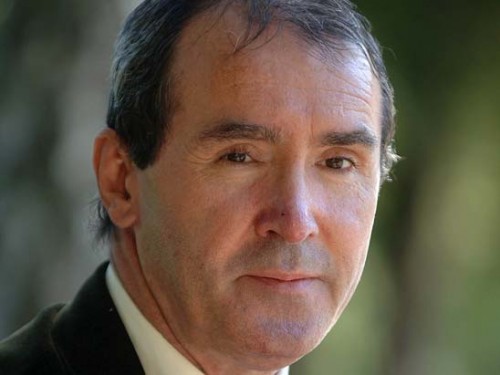
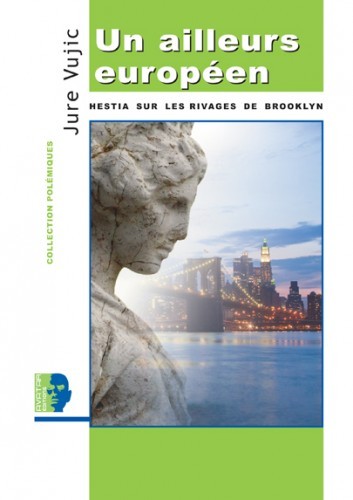 Croate et éminemment Européen, Jure (Georges) Vujic a écrit au cours des décennies 1990 et 2000 dans les revues dissidentes Vouloir et Nouvelles de Synergies européennes. Maîtrisant l’anglais, l’allemand et le français, il a fait paraître chez Avatar, une maison d’éditions bien connue pour son goût avisé de l’anti-conformisme radical, un ouvrage profond et essentiel au titre singulier : Un ailleurs européen. Hestia sur les rivages de Brooklyn.
Croate et éminemment Européen, Jure (Georges) Vujic a écrit au cours des décennies 1990 et 2000 dans les revues dissidentes Vouloir et Nouvelles de Synergies européennes. Maîtrisant l’anglais, l’allemand et le français, il a fait paraître chez Avatar, une maison d’éditions bien connue pour son goût avisé de l’anti-conformisme radical, un ouvrage profond et essentiel au titre singulier : Un ailleurs européen. Hestia sur les rivages de Brooklyn.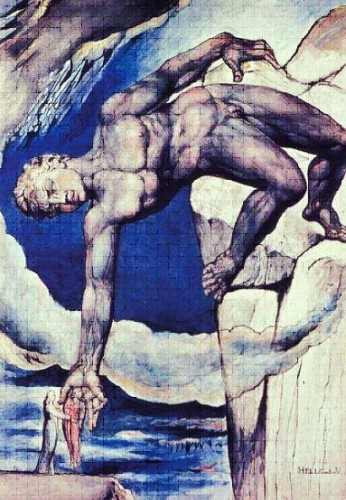
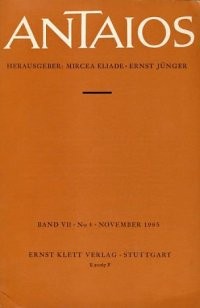 Antaios is uniting Earth and Sea, soil and water without whom both there is no life. Antaios father was Poseidon, the God of Sea and mother Gaia of the Earth. Antaios or Antaeus in Greek means as well ‘’against’’ so in this way ‘’The New Antaios’’ is in cultural and philosophical terms set to make an intellectual bulwark against that what is destroying Our European culture, tradition, heritage, folklore and with that ultimately our roots.
Antaios is uniting Earth and Sea, soil and water without whom both there is no life. Antaios father was Poseidon, the God of Sea and mother Gaia of the Earth. Antaios or Antaeus in Greek means as well ‘’against’’ so in this way ‘’The New Antaios’’ is in cultural and philosophical terms set to make an intellectual bulwark against that what is destroying Our European culture, tradition, heritage, folklore and with that ultimately our roots.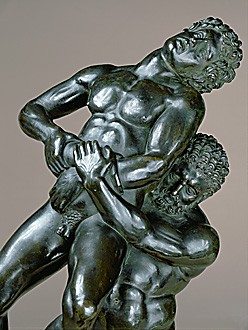 How the time is passing by I am less and less interested in Croatian politics. As a result I won’t be writing in Croatian language anymore since there is no purpose for it. I will rather use and invest my energy, effort and time for something I think will yield certain results than to write constantly for something what will anyway reach just a handful of people or just completely wither away. I have learned that from an example of the members of the ‘’Croatian Historical Revolution’’. Over the years I have read articles by leading Croatian intellectuals and scholars such as Dr. Tomislav Sunić then Dr. Jure Georges Vujić, prof. Amir Riđanović, prof. Petar Bujas (all members of Croatian group similar to G.R.E.C.E. – Arhelinea –
How the time is passing by I am less and less interested in Croatian politics. As a result I won’t be writing in Croatian language anymore since there is no purpose for it. I will rather use and invest my energy, effort and time for something I think will yield certain results than to write constantly for something what will anyway reach just a handful of people or just completely wither away. I have learned that from an example of the members of the ‘’Croatian Historical Revolution’’. Over the years I have read articles by leading Croatian intellectuals and scholars such as Dr. Tomislav Sunić then Dr. Jure Georges Vujić, prof. Amir Riđanović, prof. Petar Bujas (all members of Croatian group similar to G.R.E.C.E. – Arhelinea – 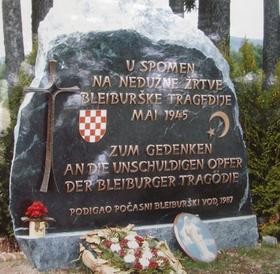 Particulièrement impitoyable, la guerre à laquelle fut confronté l’État Indépendant Croate entre 1941 et 1945 s’est achevée, en mai 1945, par l’ignoble massacre de Bleiburg (1). Tueries massives de prisonniers civils et militaires, marches de la mort, camps de concentration (2), tortures, pillages, tout est alors mis en œuvre pour écraser la nation croate et la terroriser durablement. La victoire militaire étant acquise (3), les communistes entreprennent, en effet, d’annihiler le nationalisme croate : pour cela, il leur faut supprimer les gens qui pourraient prendre ou reprendre les armes contre eux, mais aussi éliminer les « éléments socialement dangereux », c’est à dire la bourgeoisie et son élite intellectuelle « réactionnaire ». Pour Tito et les siens, rétablir la Yougoslavie et y installer définitivement le marxisme-léninisme implique d’anéantir tous ceux qui pourraient un jour s’opposer à leurs plans (4). L’Épuration répond à cet impératif : au nom du commode alibi antifasciste, elle a clairement pour objectif de décapiter l’adversaire. Le plus souvent d’ailleurs, on ne punit pas des fautes ou des crimes réels mais on invente toutes sortes de pseudo délits pour se débarrasser de qui l’on veut. Ainsi accuse-t-on, une fois sur deux, les Croates de trahison alors que personne n’ayant jamais (démocratiquement) demandé au peuple croate s’il souhaitait appartenir à la Yougoslavie, rien n’obligeait ce dernier à lui être fidèle ! Parallèlement, on châtie sévèrement ceux qui ont loyalement défendu leur terre natale, la Croatie.
Particulièrement impitoyable, la guerre à laquelle fut confronté l’État Indépendant Croate entre 1941 et 1945 s’est achevée, en mai 1945, par l’ignoble massacre de Bleiburg (1). Tueries massives de prisonniers civils et militaires, marches de la mort, camps de concentration (2), tortures, pillages, tout est alors mis en œuvre pour écraser la nation croate et la terroriser durablement. La victoire militaire étant acquise (3), les communistes entreprennent, en effet, d’annihiler le nationalisme croate : pour cela, il leur faut supprimer les gens qui pourraient prendre ou reprendre les armes contre eux, mais aussi éliminer les « éléments socialement dangereux », c’est à dire la bourgeoisie et son élite intellectuelle « réactionnaire ». Pour Tito et les siens, rétablir la Yougoslavie et y installer définitivement le marxisme-léninisme implique d’anéantir tous ceux qui pourraient un jour s’opposer à leurs plans (4). L’Épuration répond à cet impératif : au nom du commode alibi antifasciste, elle a clairement pour objectif de décapiter l’adversaire. Le plus souvent d’ailleurs, on ne punit pas des fautes ou des crimes réels mais on invente toutes sortes de pseudo délits pour se débarrasser de qui l’on veut. Ainsi accuse-t-on, une fois sur deux, les Croates de trahison alors que personne n’ayant jamais (démocratiquement) demandé au peuple croate s’il souhaitait appartenir à la Yougoslavie, rien n’obligeait ce dernier à lui être fidèle ! Parallèlement, on châtie sévèrement ceux qui ont loyalement défendu leur terre natale, la Croatie.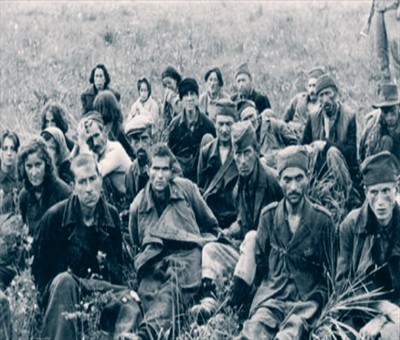
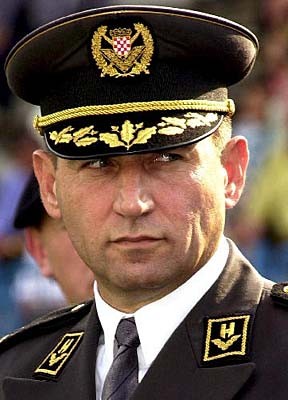
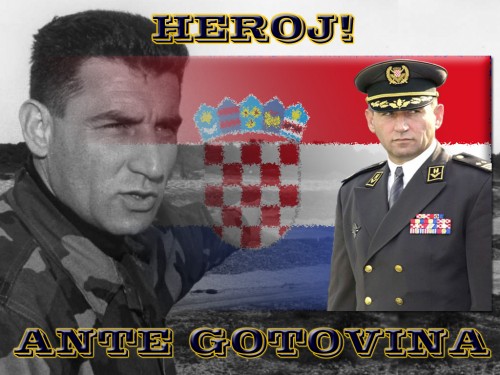
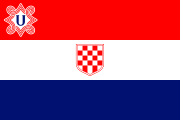 Cette année 2011 marque le 70e anniversaire de la naissance de l’État Indépendant Croate, un épisode majeur de l’histoire de la Croatie au XXe siècle mais aussi un événement qui soulève encore d’âpres controverses. Le 10 avril 1941 fut-il un accident de l’histoire, fut-il au contraire une étape logique et inéluctable de la vie nationale croate ou encore une simple péripétie orchestrée par Hitler et Mussolini pour servir leurs intérêts ? Extrêmement délicat eu égard aux méchantes polémiques que suscitent encore les faits et gestes des Croates durant la IIe Guerre mondiale, le débat n’est toujours pas clos et il n’est peut-être pas inutile de faire le point.
Cette année 2011 marque le 70e anniversaire de la naissance de l’État Indépendant Croate, un épisode majeur de l’histoire de la Croatie au XXe siècle mais aussi un événement qui soulève encore d’âpres controverses. Le 10 avril 1941 fut-il un accident de l’histoire, fut-il au contraire une étape logique et inéluctable de la vie nationale croate ou encore une simple péripétie orchestrée par Hitler et Mussolini pour servir leurs intérêts ? Extrêmement délicat eu égard aux méchantes polémiques que suscitent encore les faits et gestes des Croates durant la IIe Guerre mondiale, le débat n’est toujours pas clos et il n’est peut-être pas inutile de faire le point.